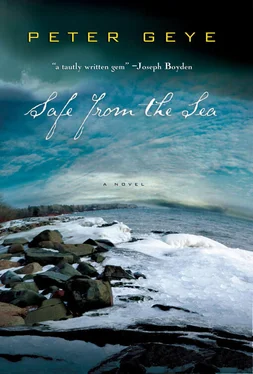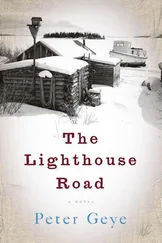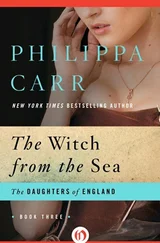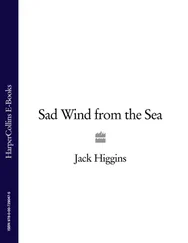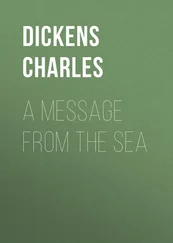One of the pieces of stainless-steel tubing was already attached to the barrel with a dozen finely placed bolts. In a pile on the table another dozen bolts appeared ready for the same purpose, and the second piece of tubing was apparently being shortened by something less than an inch. At least the hacksaw blade halfway through it suggested as much. Noah wrapped his arms around the barrel and lifted it off the workbench. It took all his strength. Though he could not imagine how the contraption might work, he admired the old man’s vision. No doubt he had a plan, and no doubt that plan would work. Had he not been a sailor, Olaf might have made a fine life as a builder. Noah had often wished for his father’s advice while in agony over how to install a new toilet or hang a chandelier from the dining room ceiling. Any of a hundred household tasks at which he inevitably failed. Long weekend afternoons with hammer-bruised thumbs. He smiled now, well removed from them.
The old man was at his afternoon nap. Later today than the day before.
Noah walked outside and crossed the yard. He began stacking the wood around the splitting stump in the yard. He thought of Nat, on her way now. He thought back through the travails of their childlessness. He remembered how the first couple years of trying had been almost magical in their ability to bring the two of them closer together. There had been such solidarity of purpose, such a marveling at prospects. It wasn’t until after the first pregnancy and miscarriage that things had actually started to seem both urgent and unlikely.
He could remember that morning vividly. He had startled himself awake from a deep sleep and found her side of the bed cold and empty. He could hear the sound of the bathroom faucet and in the grainy light could see Nat’s bare legs beneath the sink. Under the stream and splashing of water, he heard her unappeasable, almost silent, sobbing. When he stumbled into the hallway and stood in the bathroom door, she didn’t even look up. “No, no, no, no,” she muttered above her sobbing. He tried to console her, tried to hug away her quivering, but for the first time in their lives together she rejected him.
The other miscarriages had been worse in their ways — one had been twins, miscarried two days apart — but it was the first that had taken the deepest stab at their hope. The late-night talks about rearing the wonder child disappeared, her explanations of the tests and procedures her doctor was performing to isolate the cause of her infertility also ceased. So did talk of next steps. Over the next two years their inability to have a child had come to seem like an illness. It was mired in an unremitting despondency that might pop up at any time. They’d see a duckling in the pond at the park, and Nat would fall miserable for three days. If they saw a pregnant woman in the grocery store Nat would forget what they were there for. It was her sadness that had come to matter most to him, he realized. She’s somewhere near , he thought as he headed for the lake. She’ll be here before dark .
Down at the lake steely clouds mixed in the sky. The wind-whipped water curled up in waves that washed on the beach. He stepped onto the dock and bent to untie his boots. He took off his jeans and shirt, his socks and drawers, and stood naked at the end of the dock. Instantly the sweat that only a few minutes earlier had been dripping from him dried — seemed almost to encase him — as the wind curled around him. He stood there, distracted by the cold air, and had only a single moment of clarity, of apprehensive panic, before he jumped feet-first into the lake.
From the instant he went under he could feel the water seizing him. Although he’d been anticipating something like it, he could never have expected the grip of the water. If he hadn’t kicked and pulled for the surface the instant he was submerged he might have ended up sunk.
Crazy though the idea of the bath had been, both his father and grandfather had been inclined to take late-autumn and even early-winter baths. It was a point of pride between the two men. Noah could remember watching them — their long arms and lean, muscular legs, their hairy chests and long beards — as they dove into the water while the early-winter snow whitened the sky. It was a rite of passage Noah had not grown up fast enough for. As he climbed onto the dock he took a cracked bar of Ivory soap from its wooden nook on the dock, wetted it, and began lathering himself. The air felt warm in contrast with the water, and he washed away the day’s hard work and grime. He scrubbed his underarms, legs, and feet. He wetted the soap again and lathered his hair and face, his neck and arms. He washed his back. And before he could fear it, he dove back into the lake. He experienced the same convulsions, the tightening in his lungs, the stardust behind his closed eyes, but he needed a second to rinse himself, so he messed his hair with his hands and kicked wildly while he watched the soap disperse in the dark water.
Back on the dock he stood in the bracing wind as water puddled at his feet. He dried himself in the gale. Nat would not have known him there. He could not have known himself. He was — if only for a few long minutes — more his father than he had ever been. More than ever he was his son. A sense that ought to have brought with it a feeling of benevolence brought instead a pale choler. Nat would be here soon — was perhaps already up at the cabin — willing herself and Noah into parenthood with her resoluteness alone, stopping literally at nothing to add a branch to the Torr family tree. And here Noah stood, half an orphan for most of his life. He’d learned to live without his father, almost without the memory of him. He’d reinvented himself in a fashion with Nat’s help, had evolved as a man even as his father had receded ghostlike into the Minnesota wilderness. Thoughts that should have been spent on memories of the old man, on anticipating times to come, had been spent on what instead? He toed the soap back into its nook.
Aside from Nat — from their life together — and these few other things, what did he even think about? Of their childlessness, sure, but less and less even of that. Was he not entitled to recompense for the void? Would it have been better if his father had died on that night all those years ago? Whether this last was said or only thought he did not know, but soberer for it having crossed his mind, he forgave the old man all at once. Forgave him everything. He wondered whether his father would forgive him.
In the spirit of being his father’s son, he walked back up to the cabin in his boots alone.
I leave you alone for a few days and this is what I come to find?” Nat stood at the kitchen basin, scrubbing a bunch of radishes, staring at her naked husband. She was trying to make light of things, Noah knew, but the effort felt stilted. She seemed unsure of her own presence. “Hurry and dress. Soup’s on.” In the middle of the great room, before the now tempered woodstove, the card table was prodigiously set. Noah took a piece of cheese, sniffed it, tasted it. “Brown cheese,” he said, then stepped into the bedroom.
When he emerged again Nat was helping Olaf to a seat at the table.
Noah said, “When did you get here?”
“About a half hour ago.”
Olaf ladled creamy gruel from a plastic container.
“What’s that?” Noah said.
“This is black pot,” Olaf said. “What your grandmothers would have called sort gryte .” “I’m dying to hear about this,” Noah said, heading for the refrigerator. He added the smoked salmon to the feast.
“There’s not much to hear. I found this place online.” She searched for a paper bag under the cluttered countertop. “It’s called Kafe Forny. ‘Kafe’ with a K. I’m afraid it’s all cold.” She handed Noah the bag and an open bottle of beer. She offered Olaf a bottle, but he declined with a turned-down chin.
Читать дальше
